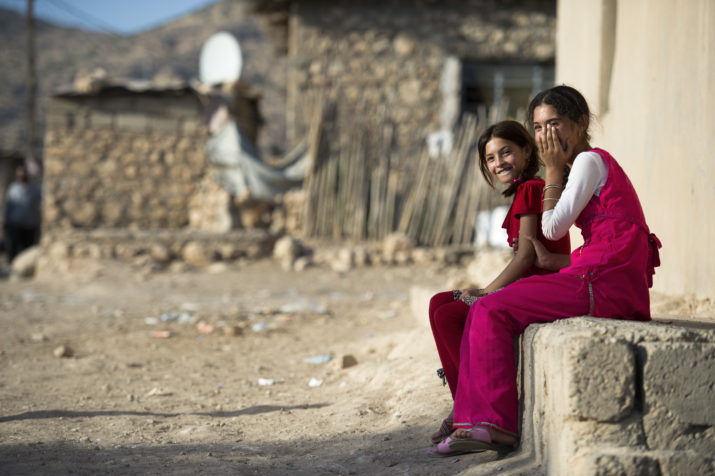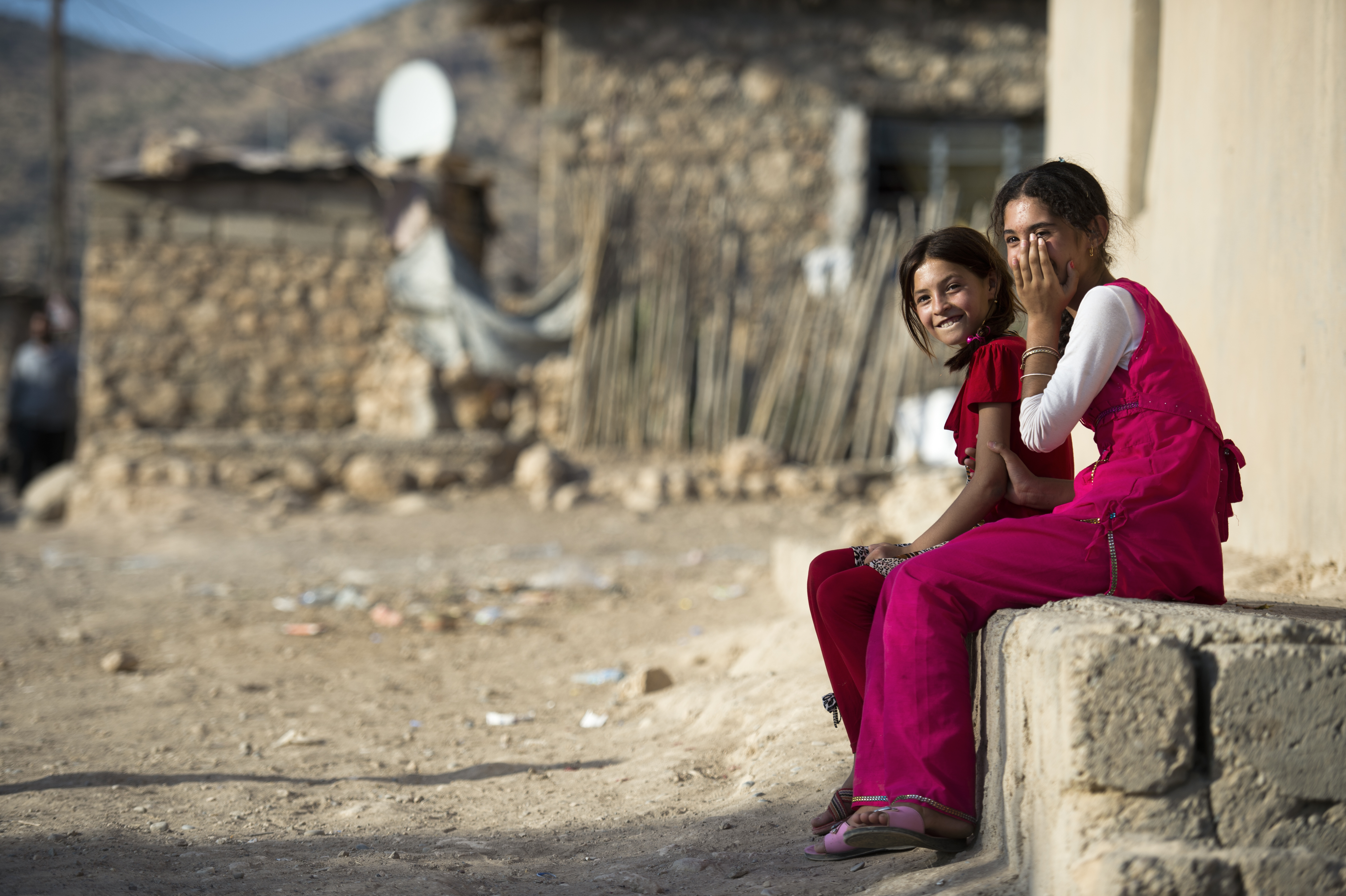
Policy Options for Social Integration of Yezidi People in Europe: the Goal of a Society for All

A social integration perspective in Europe provides an organizing framework for understanding the changing processes of complex identities. For Yezidi people, it is about new methods and forms of post-genocide survival. The increase in the number of displaced peoples in Europe is one of the most serious challenges facing Europe at large. Social integration requires capacity development, networking, the design of development programs, and recognition of people’s right to development. The policy challenge is to facilitate access to improved livelihood opportunities for Yezidi communities which have national aspirations of their own and suffer from post-genocide trauma. They are keen on preserving their cultural integrity and language.
The Yezidis have been an integral and important part of Middle Eastern history since the tenth century AD. Yezidis experienced mass massacres (seventy-three attempts), during which the whole population diminished from 23 million in the fourteenth century to two million in the eighteenth century, and to less than one million in the 1990s.[1] Today, about 80 percent of the Yezidis (approximately 500,000 people) in Iraq live in the Nineveh province (Sinjar). In Syria, the Yezidi minority live in Aleppo, Al Hasaka, Al Qamishli, and Afrin.The Yezidi Genocide involved repeated, extensive inter-ethnic massacres. Extreme violence in the form of starvation, epidemic, and abuse was also indirectly responsible for further mass deaths. The Yezidi Genocide in 2014 by ISIS contains major trends also found in previous genocide attempts. Techniques were devised, revised, or improvised to make people suffer as much as possible, either as a prelude to or in the process of being killed, as well as to humiliate and emotionally torture them (most obviously through having to watch, or participate in, the sexual abuse or death of other family members).[2] The gendered attack on Yezidi communities through rape and sexual mutilation was a major facet of this extreme violence. It often involved quite ritualized mutilation in the act of killing—drawing on a repertoire conjoining sacrificial and religious motifs with a powerful erotic charge. This repertoire presumably reflects both the cultural context of the massacres and the psychology of their perpetrators. Furthermore, their stereotypical character may have something to do with the necessary dynamics of mass killing. The Yezidi situation is dangerous in the light of regional powers’ (Iran, Turkey, Saudi Arabia) competition and rivalry in Iraq and Syria. The Yezidis seek international support and protection under the auspices of UN and like-minded powers.
There is much talk today about a new social architecture. This could hardly be a stand-alone arrangement, but rather embedded in a broader agreement on restructuring the lines of social cooperation. Assessments of the Yezidi displaced peoples’ situation in Germany and France indicate that while progress has been achieved in some areas, significant efforts still need to be made for promoting more inclusive and cohesive societies. The goal of a society, characterized by respect for all human rights and fundamental freedoms, equity, social justice, and equality, remains elusive. The recent genocide of Yezidi minority in Iraq increased the number of displaced people by over 60,000 in Germany. This has led to the heightening of protests and other forms of social peaceful rallies in Herford, Bielefeld, Hanover, Detmold, and Essen, with future events planned in Dortmund, Frankfurt, and Göttingen. Telim Tolan, Chairman of the Central Council of Yezidis in Germany (based in Oldenburg), estimated that the Yezidi minority in Iraq’s Sinjar has been in the midst of a humanitarian catastrophe.[3] The displaced people are experiencing social exclusion, many turning to unstable forms of subsistence. Poverty is a root cause of social exclusion and must be addressed if social integration is to be achieved. Recognizing people’s right to development, and making it operational, are preconditions to finding effective solutions to many of Yezidi accumulating social problems, including the problem of social integration.The pursuit of social integration is likely to remain largely a matter for national and sub-national settings in Germany and France, but the international community can help establish a supportive atmosphere for Yezidi community. The migration crisis in Europe has forcefully demonstrated the risks associated with violence, crime, and social disintegration. There are indications of a change in approach by the UN, EU, and the USA towards Yezidi situation issues. In the wake of the interest in Yezidi problems within the context of Nadia Murad’s Nobel Peace Prize and the charges related to ISIS atrocities in Iraq and Syria, governments in Germany and France are fully committed to addressing particular attention to the issue of the regulatory framework for monitoring the operations of social institutions at both national and international levels. This should include adoption of measures to control human rights abuses.
Market economies and democratic political institutions are generally known for reducing legal barriers to equality. However, in most societies, there are major limitations to the operation of these principles. Foremost among these are unequal access to earning opportunities, status factors, such as ethnicity, and other features of the system of social stratification. Social integration requires investment in social institutions and capital, enhancing social networks and relationships, building consensus, and generating individual, organizational and institutional capabilities especially for those living in exile or marginalized. Education reforms should not only expand the coverage of the educational system, but also improve its quality, equity of access, and the relevance of contents. The media also have an important role to play in fostering social integration. It is essential for the disadvantaged and post-genocide ethnic group to have access to the media for social integration. A coherent set of legislative measures and programs to strengthen the small business sector is needed. It may be useful to explore broad-based social policies and redistributive measures that can ensure a higher standard of living for those living in exile without jeopardizing their jobs. However, social integration is just the beginning and only part of the answer. We also have to cast aside some of our failed solidarity models and develop a new paradigm of social integration. The other part stems from redoubling efforts to provide education, training, and skills on demand to the Yezidi citizens of Germany and France. Both states identify the goal of universal and equitable access to quality education for all citizens. They committed themselves to the implementation of national strategies for universalizing basic education and improving the quality of education, ensuring also full and equal access to education for girls and women. Social stability depends also on the development of human capital, through public investment in basic education and health services including psychological assistance for the victims of the jihadist groups in Iraq and Syria.
Governments can act in several areas to increase Yezidi human capabilities and widen the narrow band of existing economic opportunities for them. The refugee welcome program in France has promoted shelter for more than one hundred Yezidi women and children.[4] Post-genocide assistance programs have been launched around the world by diaspora communities of migrant workers in the non-governmental sector. These organizations have been remarkably successful in influencing health practice and the international health agenda, especially given the serious financial constraints under which they have operated. There is now a need for governments in France and Germany to work in tandem with these organizations, provide needed funding, and expand the scope of these efforts. Another key strategy is to undertake an educational reform agenda that is centered in increasing the quantity and quality of primary and secondary schooling for refugees, thus overcoming genocide. A number of actions can be taken to widen displaced peoples’ economic options, where both government and the private sector can play pivotal roles.
The ultimate impediment to social integration is the failure to honor security for all. On the other hand, it is reasonable to suppose that certain population groups in Germany and France will re-think the current concept of social integration as a big push towards greater cooperation for establishing adequate rules and institutions for the stability, security, democracy, and peace in their respective societies. As Nadia Murad noted, Yezidi women are “looking for peace and they are feeling comfortable now because they know that France is a country that wants peace. They will be safe here because it’s a country that respects the law.”[5] Rapid reduction of the number of refugees and displaced peoples living in absolute poverty is the central goal of the European countries’ governments’ policy. Migrants not only lack sufficient income, but also cannot get the most basic health care, education, or shelter provision. They lack access to opportunities, are isolated, and powerless. Often, migrants are excluded because of factors such as ethnicity, religion, geography, gender, and disability, with no influence in the decisions that affect their lives. The promotion of social integration encapsulates these concerns. Migration governance is committed to combating social exclusion, to address the processes that hinder the achievement of stable, safe and just societies. Processes of social exclusion create an unstable environment in which collective well-being, including migrants’, may be ultimately threatened. European governments are fully committed to addressing the causes of social exclusion, and are in support of eliminating violence as the worst expressions of migrants’ protest against deprivation, homelessness, and school exclusion. The notion of social exclusion that has recently been at the core of policy analysts’ and practitioners’ debates emphasizes that deprivation is multi-faceted, and focuses on the relations and processes that cause deprivation. Lack of income is usually the result of lack of assets or access to labor market. Bad health and lack of education are both the cause and consequence of a low economic status. The notion of social exclusion further recognizes that low social status is not about material and physical deprivation, but involves people’s self-respect, dignity, and sense of identity, and their access to decision-making structures and institutions. Crucially, these dimensions tend to reinforce each other, creating spirals of vulnerability for migrants.
Social exclusion implies a focus on the social relations that cause deprivation, as well as the processes and institutions that underlie and are part and parcel of deprivation. The delivery of aid in a conflict situation may not be achievable without strengthening community-based organizations so that migrants can demand the services to which they are entitled. Participatory political systems have proven to be the most effective modality for peaceful management of social cleavages in general, and ethnic conflicts in particular. Modern socio-economic formations with strong value systems moderate, reduce, or even eliminate primordial loyalties. The latter offer members of ethnic groups a substitute or at least a partial alternative for collective protection, and enhancement of legitimate rights and needs. They allow for the kind of cross-crossing modern associational networks, which have come to be lumped under the concept of civil society. In its broad sense, “civil society” would include political parties, professional associations, and other non-governmental organizations on the community and national levels. This kind of associational network has proven to be the nerve of participatory political systems even when some of them are avowedly “apolitical.” Participatory politics may contribute, in some Middle East region countries (Iraq and Syria), to initial political instability or lead to various forms of demagogy. Rival ethnic leaders may engage in “gunmanship politics,” but in the medium or long term, responsible democratic politics is bound to prevail. In countries with sizeable ethnic groups concentrated in one province or geographic area, separatist tendencies’ may also be expected, once the political system is opened to free expression and free balloting. While such a right must be conceded in principle, it could in practice result in chaos.
“Federalism” or even “confederalism” can be real options to avoid the negative effects of such an eventuality. The flexible and imaginative application of “federalism” could make functional equivalent of the new system. Federalism would reconcile the legitimate impulse of ethnic minorities to preserve their lifestyle, traditions, and territorial integrity with the legitimate right of ethnic groups to preserve their culture, human dignity, and political autonomy. Development cooperation has an important role in promoting the emergence of inclusive, cohesive societies. These are built through policies—formulated by as wide a representation of civil society as possible—that promote equity, citizen participation, and social justice. The ultimate impediment to social integration is the failure to honor all human rights for all. Inclusive societies are based on rights. Rights provide the framework against which people can become full members of society. “Human rights” are about the possibility of being a full member of society. This implies recognition of all rights for all in the development process and tackling the structures of society that result in discrimination and impoverishment. Human rights are economic, social, and cultural, as well as civil and political. They are interdependent and indivisible.
Governments have the responsibility to provide the environment for helping people both recognize and achieve their rights. Rights are the basis on which inclusive societies function. Targeted interventions to assist refugees work better if they are based on rights, because it enables migrants to force the administration to work better. It seems evident that the economic exploitation and psychological exclusion of the informal diaspora communities of migrant workers create an insecure community. As Kinhide Mushakoji notes, “they reproduce a frustrated identity feeling, which is often strengthened by the majority citizens joining in the colonialism of the global governance often taken for granted as sustainable.”[6]
Another growing obstacle to achieving social cohesion in Europe is the sort of fragmentation associated with ethnic, religious, and cultural reactions to the impacts of globalization. These differences were, to a certain extent, muffled during the years of violent conflicts and genocide. A society for all includes associative structures, respect for all human rights and fundamental freedoms, the creation of an environment enabling social integration, and would ensure more equal opportunities for all peoples to resources and social services. All of these examples form the substratum for the creation of institutional reforms ensuring appropriateness of assistance policy prescriptions. This can be explained by the speed of change, as well as deep-rooted cultural and social habits and hybridization of modernism and tradition. We should nevertheless emphasize the fact that we are witnessing the reassessment of the impacts of globalization and regionalization that have occurred in the last few years. It creates space for new ideas and proposals for the refugee welcome program. Multi-ethnic accommodation democracy plays an essential part in setting up partnerships.
Olga A. Vorkunova is Senior Researcher of the Primakov National Research Institute of World Economy and International Relations, Russian Academy of Sciences, Assistant Professor of the Moscow State Linguistic University.
Samvel Kochoi is Doctor of Science (Law) and Professor of the Kutafin Moscow State Law University (MSAL).
Acknowledgments: The study was carried out with the financial support of the grant of the Ministry of Science and Higher Education of the Russian Federation (Project No. 29.4916.2017 / 8.9)
References
[1] Dave Van Zoonen, Wirya Khogir. “The Yazidis Perceptions of Reconciliation and Conflict,” MERI Policy Paper, October(2017).
[2] Samvel Kochoi, “The Crime of All Crimes” of the Terrorist Organization “Islamic State”: the Yazidis Genocide”, Kutafin University Law Review, 2017, vol. 4, no 1, http://www.kulawr.ru/articles/article_103158.html?issue=kulawr-1-2017 (accessed Jan. 18, 2019).
[3] Yazidis rally in Germany against ‘IS’. https://www.dw.com/en/yazidis-rally-in-germany-against-is/a-17843457 (accessed Jan.5, 2019)
[4] France welcomes Yazidi women and children fleeing IS group. https://www.france24.com/en/video/20181221-france-welcomes-yazidi-women-children-fleeing-group (accessed Feb.28, 2019)
[5] https://www.france24.com/en/video/20181221-france-welcomes-yazidi-women-children-fleeing-group (accessed Feb.28, 2019)
[6] Kinhide Mushakoji, “Peace Studies and Peace Politics. Multicultural common security in North-South conflict situations”, in Handbook of Peace and Conflict Studies, ed. Charles Webel and Johan Galtung (London: Routledge, 2007): 89.
Photo: REFUGEE CAMP, DOHUK, KURDISTAN, IRAQ – 2014 AGUST 13 | Yazidi people who escaped abuse from ISIS outside her tent in Kanke refugee camp
Published on January 30, 2020.




